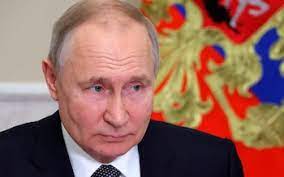Hamish De Bretton-Gordon
It comes as no surprise that Vladimir Putin rules Russia in spectacularly corrupt fashion. We all know how money is siphoned from the state and funnelled to his allies and oligarchs, as well as his own pocket. For years, this systemic corruption strengthened his grip on power, yet for his forces in Ukraine – despite the stalemate on the front lines, and undue pessimism from certain quarters – this criminality continues to do the opposite, slowly but steadily weakening the Russian ability to wage war and eroding Putin’s ability to control events.
Despite appearances, the Russian invasion is still falling apart – quite literally in the case of some poorly maintained vehicles and naval equipment – as a direct result of the rot at the heart of the Kremlin. The news that a Russian tank commander was arrested last week and accused of stealing the engines out of battle tanks comes as no surprise; neither are the recent revelations of the decrepit state of much of the Russian navy. It’s the perfect illustration of the insurmountable moral rot plaguing Putin’s gangster state. The spectacular losses of armoured vehicles suffered by Moscow’s forces was initially a surprise to Western analysts; now I’m inclined to think they may well have been sitting ducks, with critical components sold for scrap or maintained on the cheap. In hindsight, we should have seen it coming: I can remember stories from my time serving as a tank commander in the Cold War facing off against the Russians in Germany. It was common to hear about Russian tank soldiers stealing engine coolant to drink for its intoxicating properties or flogging diesel supplies to buy food.
As for the state of the navy, Russia’s only aircraft carrier, Admiral Kuznetsov, has been out of action since 2018 thanks to a toxic combination of botched repairs and blatant illegality. In March 2021, the general director of the shipyard was arrested in connection with embezzlement of funds. The carrier is not predicted to return to active service until 2024 at the earliest. Meanwhile, the similarly antiquated nuclear-powered flagship of the Northern fleet, Peter the Great, will probably have to be scrapped because it is too expensive to modernise. So much for a country “bouncing back” from its earlier humiliations in Ukraine, such as the memorable sinking of the Moskva. It is worth remembering, too, that many in the intelligence community believe that even Putin’s trump card – his much-vaunted tactical nuclear weapons – would not actually work properly because of age and mismanagement, even if the soldiers manning them could be persuaded to deploy them, which is far from clear.
As a former soldier, I remain certain this rot will inevitably deprive Russians of the will to fight. The most effective soldiers the Kremlin has left are the criminals that have been sprung out of jails across Russia to fight with the mercenary Wagner Group. But the moral component to fighting spirit is embedded in the belief and right of the fight, and the “silver” shilling of encouragement will only glint for so long. Russian gold is now badly tarnished and the exploitation of the people by a small elite is now all too obvious. The Kremlin’s coin will eventually poison those who cherish it and lead to Russia’s capitulation. The timing of this implosion will entirely depend on Western resilience to keep giving Ukraine the weapons it needs to drain the Russians of their morale and ability to fight. Reports that Ukrainian units are having to ration shells when they have the might of so many advanced industrialised countries behind them shames us all. This is 2023, not 1915. To those who think Russia can still summon an unstoppable wave of men and materiel like in the Second World War, think again. Putin’s gangsters have pillaged their own country, normalised corruption throughout the ranks of the military, and, in doing so, doomed themselves to defeat. The moral corruption endemic in Russia will bring Putin down, as it has countless tyrants before him. It is only a matter of time, if the West shows the same resilience in supporting Ukraine as the Ukrainians have in defending their country.
The Telegraph







